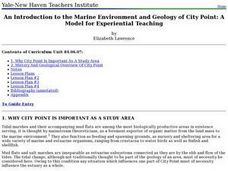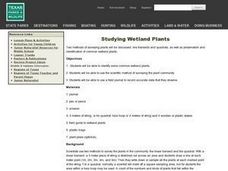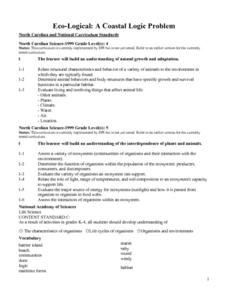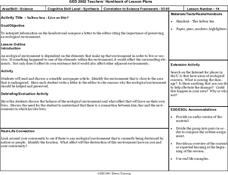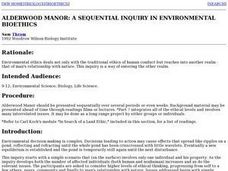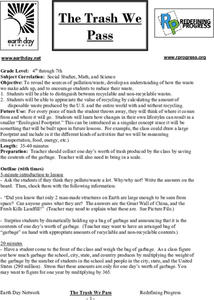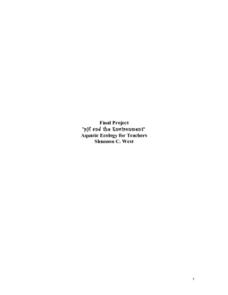Curated OER
Backyard Wildlife Conservation
Students survey local wildlife. They distinguish between permanent and migrating or seasonal species. Students identify species and describe the ecological niche. Students research the food chain and food web for the backyard...
Curated OER
Volcano Above the Clouds
Students develop a travelogue to describe the distinct ecological regions of Mount Kilimanjaro. They describe the health issues that may affect climbers, and any necessary equipment or safety precautions that the team may need at each...
Curated OER
An Introduction to the Marine Environment and Geology of City Point: A Model for Experiential Teaching
Students begin the lesson by researching the history of City Point, Connecticut. Using a map, they color areas they were asked to find and discuss why the areas are important to the community. As a class, they are shown recent slides...
Curated OER
Lake and Pond Study
Learners examine the habitat and community structure of a pond that could support Ospreys through games and worksheets. They then go on a field trip to a pond to evaluate the suitability of the pond as an Osprey habitat.
Curated OER
Let us Help
Students explore water conservation. In this ecology and civic responsibility lesson, students identify agencies that monitor and help improve water quality and describe what they do. Students research these organizations and work in...
Curated OER
Organic Farming / Agriculture
Want an organic farming resource packed with experiments, background information, science fair projects, and topics of interest for further research? Here it is. Young environmental scientists can explore concepts involved in organic...
Curated OER
Studying Wetland Plants
Students identify some common wetland plants. they use the scientific method of surveying the plant community to record accurate data that they observe. they cut a sample of each plant and save in plastic bags to identify and preserve...
Curated OER
Eco-Logical: A Coastal Logic Problem
Fourth graders study the characteristics of five coastal communities. They use logic cards and matching activities to identify the proper community for plant and animal species.
Curated OER
Leaf Pack Study
Students conduct an experiment using leaf packs. In this leaf lesson plan students complete an activity in groups and complete a handout.
Curated OER
Salton Sea - Live or Die?
Students read and discuss the scientific article attached to the lesson. They compose a letter to the editor citing the importance of preserving an ecological environment.
Curated OER
Using A Winogradsky Column to Analyze Microbial Communities
Pupils use easily obtained materials to study ecological succession in a microbiological community. They collect water samples from outdoor sources in plastic bottles to observe and record changes.
Curated OER
Alderwood Manor: A Sequential Inquiry in Environmental Bioethics
Learners explore bioethics. They discuss the traditional ethics of human conduct and man's relationship with nature. Students identify ethical dilemmas. They discuss ramifications of economic and ecological concerns with bioethics.
Curated OER
Succession and Experimental Process
Students describe the roles of controlled, manipulated and responding variables in scientific research. They also identify biotic and abiotic interactions affecting the makeup of a plant community.
Curated OER
Model Professionals
Students learn about one scientist's quest to make her field of canopy ecology accessible to a wider audience and to synthesize their knowledge by developing toy figures that could potentially educate children about different scientific...
Curated OER
Benthic Macroinvertebrates
Learners survey and describe a stream ecosystem. They sample the benthic macroinvertebrate populations of a given stream and determine community structure through the use of the Chandler Index and a species diversity index.
Curated OER
Coordinated Resource Management Exercise
Students role play the roles of groups who have an interest in natural resource ecology. In groups, they identify an issue of importance to their community and discuss the various solutions that have been offered to solve this problem. ...
Curated OER
THe Trash We Pass
Students identify the sources of pollution and waste in their community. They examine the process of recycling and how to eliminate some of their family waste.
Curated OER
Native American
Students investigate how early European exploration and colonization resulted in cultural and ecological interactions among previously unconnected peoples. They comprehend that Europeans had misconceptions about Native American literacy...
Curated OER
"pH and the Environment"
Eighth graders experiment and study about acids and bases by becoming involved in direct hands-on learning experiences and then relate those experiences to their own lives. They experience the Ohio River and what can be done to help...
Curated OER
Zebra Mussel Population Simulation
Students are taught how to format and enter data into an Excel spreadsheet. They make a graph, and interpret graphed data. Students discuss the possible impacts of zebra mussels on the Hudson river. They graph zebra mussel data.
Curated OER
Ecosystem Interdependence
Students outline a scenario demonstrating ecosystem interdependence. They explain the effects of this change according to the food web. They give a positive example such as increased rain and have the students call out answers to your...
Curated OER
Population Dynamics
Students discover how organisms are dependent on one another for survivial. They also discuss how to conserve natural resources. They compare and contrast the different types of symbiotic relationships as well.
Curated OER
Earth's Ecosystem: Seven Major Biomes
Students discuss the different types of ecosystems and the composition of biomes. Working in groups, they define various related terms and make posters of them. Then they explain their posters to the class.
Curated OER
Aquatic Ecosystems
Ninth graders record information on aquatic ecosystems and create a labeled diagram of an ecosystem of their choice. They can choose from an ocean zone, estuary, river, lakes, or beaches. The student has to explain their biome of choice.




